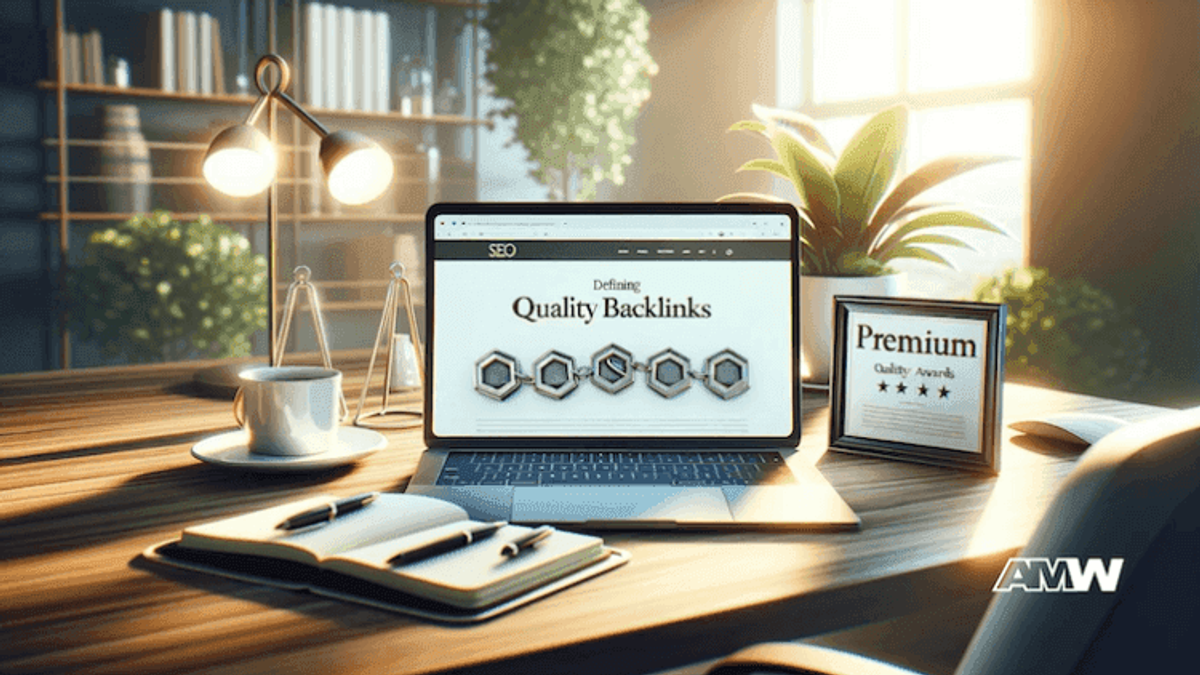The Importance of Backlinks in SEO: Quality vs. Quantity?

In digital marketing, SEO remains critical for online success. One of the main elements of SEO is backlinks, which serve as endorsements from other websites, vouching for the credibility and relevance of your content. However, a crucial question arises: Should businesses focus on the quality or quantity of backlinks? This blog delves into the significance of backlinks in SEO and explores the delicate balance between quality and quantity.
Quick Summary
In digital marketing, SEO hinges on backlinks, which act as endorsements to enhance a site's credibility. The focus should be on quality rather than quantity. Quality backlinks from reputable domains improve search engine rankings and drive sustainable traffic, while an excessive emphasis on quantity can lead to penalties. Companies should prioritize ethical practices by creating valuable content, building industry relationships, and audit their backlink profiles regularly to foster long-term su
What are Backlinks?

Backlinks, or inbound or incoming links, are hyperlinks from one website to another. It tells search engines that your site can be trusted. They vote for confidence from one site to another, influencing how search engines perceive your website's authority and relevance.
There are three primary types of backlinks:
Ready to Grow Your Business?
Get a custom strategy tailored to your goals.
- Natural Backlinks: These backlinks occur when other sites link to your content because they find it valuable.
- Manually Built Backlinks: These are acquired through deliberate efforts, such as outreach to bloggers and influencers for guest posts or collaborations.
- Self-Created Backlinks: These are created by adding links to your website in various online directories, forums, or blog comments.
Understanding these types of backlinks is essential for developing an effective SEO strategy.
The Importance of Backlinks in SEO

Backlinks are more than just a means of driving traffic; they are fundamental to a successful SEO strategy for several reasons:
- Trust and Credibility: Backlinks from reputable websites enhance your site's credibility.
- Search Engine Algorithms: Search engines use backlinks as a ranking factor. A strong backlink profile can boost your site's position in search engine results pages (SERPs).
- Organic Traffic: High-quality backlinks can drive substantial organic traffic to your site. When users find your content linked to reputable sites, they are more likely to visit your site, leading to increased traffic and conversions.
- Brand Authority and Visibility: Backlinks contribute to building your brand's authority and visibility online. Being referenced by other well-regarded sites in your industry positions your brand as a leader and enhances its visibility to a broader audience.
Quality vs. Quantity: Understanding the Difference

When it comes to backlinks, not all are equal. The debate between quality and quantity is central to any effective SEO strategy.
Defining Quality Backlinks
Quality backlinks are those that come from reputable, relevant websites. Key characteristics of quality backlinks include:
- Relevance and Context: The linking website's content should be relevant to your site's niche. Contextual links within the content are more valuable than those in footers or sidebars.
- Authority of the Linking Domain: Links from high-authority domains (e.g., established news sites, government pages, or well-known industry blogs) carry more weight.
- Natural and Organic Links: Links earned organically, without solicitation, indicate genuine endorsement and are highly valued by search engines.
Defining Quantity in Backlinks
Quantity is the number of backlinks pointing to your site. While having a large number of backlinks can be beneficial, it's crucial to understand the implications:
- Volume of Backlinks: A higher number of backlinks can improve visibility and domain authority, but only from diverse and reputable sources.
- Impact on Short-term vs. Long-term SEO Strategies: Focusing solely on quantity might yield quick wins in traffic spikes, but without quality, it can lead to penalties and damage to your site's reputation.
Ready to Grow Your Business?
Get a custom strategy tailored to your goals.
The Impact of Quality Backlinks

Investing in quality backlinks can have a profound impact on your SEO efforts. Here's how:
- Higher Search Engine Rankings: Quality backlinks from authoritative sites improve SERP rankings.
- Improved Domain Authority: A robust profile of quality backlinks enhances your DA, making it easier for your site to rank for competitive keywords.
- Sustainable Organic Traffic Growth: Unlike the temporary traffic spikes from quantity-focused strategies, quality backlinks contribute to sustained organic traffic growth, providing long-term benefits.
- Case Studies or Examples: Consider businesses that have successfully leveraged quality backlinks. For instance, a company with a series of guest posts on industry-leading blogs might see a steady increase in traffic and higher search engine rankings.
The Risks of Focusing on Quantity Over Quality
While increasing the number of backlinks might seem advantageous, prioritizing quantity over quality can have detrimental effects:
- Potential for Penalties: Search engines like Google have stringent guidelines against spammy backlink practices. Acquiring low-quality or irrelevant backlinks can lead to penalties, severely impacting your site's visibility.
- Short-term Gains vs. Long-term Consequences: Quantity-focused strategies might deliver immediate traffic boosts but often lack sustainability. Over time, search engines may devalue these links, leading to drops in rankings.
- Risk of Attracting Low-Quality or Spammy Backlinks: Pursuing quantity can result in backlinks from dubious sources, harming your site's credibility and trustworthiness.
- Examples of Harm: Websites that have faced penalties due to low-quality backlink strategies serve as cautionary tales. These sites often experience significant drops in rankings, traffic, and overall online presence.
Strategies for Building High-Quality Backlinks

To build a robust backlink profile, consider the following strategies:
- Creating Valuable, Shareable Content: High-quality content naturally attracts backlinks. Focus on producing informative, engaging, and original content that others will want to reference.
- Building Relationships with Industry Influencers: Engage with influencers and thought leaders in your industry. Collaborative efforts, such as guest posts and joint webinars, can lead to valuable backlinks.
- Guest Posting on Reputable Sites: Identify strong blogs and sites in your niche and offer to contribute guest posts. This will earn you backlinks and expose your content to a broader audience.
- Utilizing Social Media and Content Marketing: Promote your content through social media channels and content marketing strategies. More visibility can lead to more natural backlinks.
- Monitoring and Analyzing Backlink Profiles: Regularly review your backlink profile using SEO tools to identify and disavow low-quality links, ensuring your backlink strategy remains effective.
Ready to Grow Your Business?
Get a custom strategy tailored to your goals.
Balancing Quality and Quantity: Best Practices
Getting the right balance between quality and quantity is crucial for a successful SEO strategy. Here are some best practices:
- Setting Realistic Goals: Define clear, achievable goals for backlink acquisition. Focus on quality while gradually increasing the number of reputable backlinks.
- Regularly Auditing and Cleaning Up Backlink Profiles: Conduct audits to identify and remove harmful or irrelevant backlinks. Use tools like Google Search Console to disavow low-quality links.
- Using Tools and Resources for Backlink Analysis: Leverage SEO tools such as Ahrefs, SEMrush, and Moz to analyze your backlink profile, track performance, and identify opportunities for improvement.
- Staying Updated with SEO Best Practices and Changes: Stay informed about the best practices and updates to ensure your strategy remains compliant and effective.
Conclusion

Backlinks are a cornerstone of effective SEO, but the debate between quality and quantity requires careful consideration. While both aspects are important, prioritizing quality over quantity can lead to sustainable success and long-term benefits. By adopting ethical and strategic backlink practices, companies can enhance their online presence, get more organic traffic, and achieve higher search engine rankings.
FAQ

What is the difference between quality and quantity backlinks?
Quality backlinks come from reputable, relevant websites and enhance your site's credibility, while quantity backlinks focus on the number of links, regardless of their source.
Can too many backlinks harm my website?
Yes, if the backlinks are from low-quality or spammy sources, they can lead to search engine penalties and harm your SEO efforts.
What are some strategies for acquiring quality backlinks?
Strategies include creating high-quality content, building relationships with industry influencers, guest posting, and leveraging social media.
How often should I audit my backlink profile?
It's recommended to audit your backlink profile regularly, at least quarterly, to ensure the quality and relevance of your backlinks.
Are all backlinks created equal?
Backlinks vary in quality based on factors like the authority of the linking site, relevance, and the nature of the link (organic vs. manual).
Ready to Grow Your Business?
Get a custom strategy tailored to your goals.
Related Resources
Calculators
Pricing Guides
Key Terms
Optimization of individual web page elements including content, HTML source code, and meta tags to rank higher in search results.
Keyword DifficultyA metric estimating how hard it would be to rank on the first page of search results for a specific keyword.
Content DecayThe gradual decline in organic traffic and rankings that content experiences over time as it becomes outdated or outranked.
Brand SalienceThe degree to which your brand comes to mind quickly and easily when customers think about your product category.
Answer Engine OptimizationOptimizing content for AI answer engines and conversational search interfaces.
Related Articles

The Role of SEO in Company Growth: Key Tactics and Benefits
SEO is about improving a website to rank higher in SERPs, increasing the site's visibility and driving organic traffic. By implementing an effective SEO strategy, companies can enhance their online pr

Mastering SEO Content Development: The Ultimate Guide to Higher Rankings
SEO content development is vital for businesses aiming for online visibility. It merges compelling content creation with search engine optimization, focusing on keyword research, user intent, and...

Expert SEO Tips for Higher Rankings in Search Results
SEO is the backbone of online visibility. It ensures that your site appears in search when customers look for relevant keywords. Without effective SEO, even the most well-designed website can remai